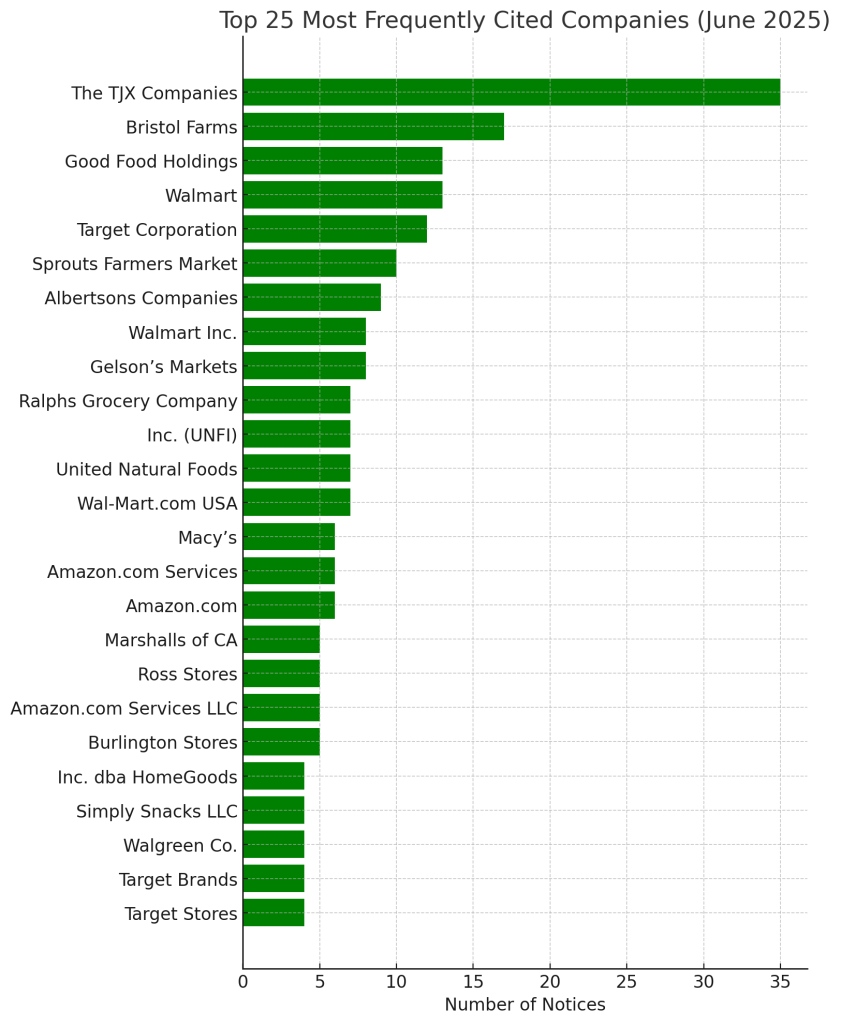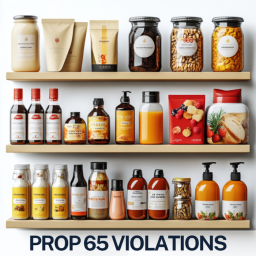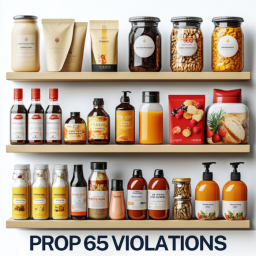
California’s Proposition 65 continues to serve as a powerful regulatory and litigation tool, with sweeping implications for food, supplement, cosmetic, and household goods companies. In June 2025, 352 Notices of Violation (NOVs) were issued—underscoring ongoing scrutiny of chemical exposure risks across everyday consumer products, including food items, wellness goods, thermal labels, and art supplies.
This monthly analysis examines the most cited chemicals, product categories, and enforcement patterns. Whether you’re a manufacturer, importer, or retailer, staying informed of Prop 65 trends is essential for managing risk and ensuring compliance with California’s complex regulatory framework.
June 1–30, 2025 Proposition 65 Notice of Violation Summary
| Number of Violations | Listed Chemicals | Types of Products Targeted |
|---|---|---|
| 179 | Lead and lead compounds, Cadmium and cadmium compounds | Seafood (clams, mussels, scallops), ceramic mugs, bells, knives, artist paints |
| 61 | Di(2-ethylhexyl)phthalate (DEHP) | Cosmetic bags, vinyl accessories, plastic wraps |
| 29 | Bisphenol A (BPA), Bisphenol S (BPS) | Thermal receipt paper, labels, stickers, canned food linings |
| 7 | Diethanolamine, cocamide DEA | Shampoos, hair care products, body wash |
| 6 | Perfluorooctanoic Acid (PFOA) and other PFAS compounds | CBD topicals, waterproof packaging, personal care containers |
What Is Proposition 65 and Why Does It Matter?
Proposition 65 (formally, the Safe Drinking Water and Toxic Enforcement Act of 1986) requires companies to warn consumers about significant exposures to over 900 chemicals known to cause cancer or reproductive harm. While the law aims to protect public health, it has created a fertile ground for lawsuits—particularly over trace levels of substances like lead, BPA, and phthalates.
Companies found in violation may face:
- Civil penalties up to $2,500 per violation per day
- Mandatory product reformulation or labeling
- Public enforcement lawsuits by private plaintiffs
- Costly legal fees and settlement obligations
What Are the Most Common Chemicals Cited in Prop 65 Enforcement in May 2025?
| Chemical | Notices of Violation |
|---|---|
| Lead and lead compounds | 102 |
| Cadmium and cadmium compounds | 77 |
| Di(2-ethylhexyl)phthalate (DEHP) | 61 |
| Bisphenol A (BPA) | 17 |
| Bisphenol S (BPS) | 12 |
| Diethanolamine | 6 |
| Perfluorooctanoic Acid (PFOA) | 6 |
Notable Chemical Trends in June 2025
Lead in Home Goods and Decor:
Lead continues to dominate enforcement actions, appearing in products like metal and glass ornaments, kitchen tools, and holiday decorations. Items often cited include mugs, containers, and decorative consumer goods where trace metals leach from glazes or coatings.
BPS in Retail Receipts and Thermal Labels:
Bisphenol S (BPS)—a BPA substitute—was again widely targeted. June enforcement notices focused on thermal receipt paper and thermal shipping labels, underscoring ongoing risks for retailers, food service, and ecommerce operations. BPS lacks a defined safe harbor level, making exposure thresholds difficult to defend.
Cadmium in Art Supplies and Packaging:
Cadmium and its compounds were frequently cited in artist-grade paste paints, decorative coatings, and food-contact packaging. Retailers offering imported art materials should remain particularly cautious.
Phthalates in Plastic Accessories:
Phthalates like DEHP and DINP were cited in items such as PVC cosmetic bags, plastic-wrapped stools, blower fans, and children’s plush toys with vinyl features. This reflects continued scrutiny of flexible plastic components and children’s product lines.
Diethanolamine in Grooming Products:
Personal care products—including styling gels and facial treatments—were cited for Diethanolamine, a chemical commonly found in foaming agents. Despite appearing in small quantities, its classification as a carcinogen makes enforcement aggressive.
PFAS in Waterproof Goods and Packaging:
Though fewer in number, notices involving Perfluorooctanoic Acid (PFOA) and PFOS highlight increasing scrutiny of water-resistant coatings, shipping containers, and cannabis packaging materials. PFAS enforcement remains a high-risk area due to the absence of safe harbor levels.
Product Categories Most Frequently Targeted IN JUNE 2025
Food and Beverage
- Mussels, clams, and scallops (especially from Gelson’s)
- Pickled goods and curry spice pastes
- Canned and jarred condiments
Beauty and Wellness
- CBD oils and lotions
- Shampoos and body washes
- Cosmetic accessories and bags
Household and Packaging
- Thermal receipt paper and adhesive labels
- Ceramic mugs with printed designs
- Vinyl-wrapped goods
Art Supplies
- Artist-grade paint pastes and glazes

Who’s Being Targeted? The Top 10 Most Cited Companies in May 2025
| Company Name | Notices Received |
|---|---|
| The TJX Companies | 35 |
| Bristol Farms | 17 |
| Good Food Holdings | 13 |
| Walmart | 13 |
| Target Corporation | 12 |
| Sprouts Farmers Market | 10 |
| Albertsons Companies | 9 |
| Walmart Inc. | 9 |
| Gelson’s Markets | 8 |
| Ralphs Grocery Company | 8 |

What Risks Do Licensors Face When Licensees Trigger Prop 65 Violations?
Licensors must remain vigilant—even when they do not directly manufacture or distribute a product. If your brand name appears on the packaging, you could be named in a violation.
Key Protective Measures:
- Require Prop 65 compliance certifications in all license agreements
- Mandate periodic chemical testing by licensees
- Include indemnity and insurance provisions
- Conduct routine product audits and e-commerce monitoring
How Can My Company Avoid a Prop 65 Lawsuit?
1. Perform Ingredient and Packaging Testing
Use third-party labs to screen your finished goods and raw materials for heavy metals (lead, cadmium, arsenic), acrylamide, and phthalates. Repeat tests after sourcing or formulation changes.
2. Evaluate and Update Warning Labels
Make sure your labels:
- Follow safe harbor language requirements
- Are specific to the chemical risk involved
- Appear clearly and prominently on packaging and online
3. Strengthen Your Supplier Agreements
Add chemical compliance warranties and indemnification clauses to every vendor agreement.
4. Monitor New Notices and Industry Trends
Watch competitor categories. If others are being targeted, you’re likely at risk too.
5. Engage Experienced Legal Counsel
If you receive a 60-day notice, contact your attorney immediately. At Juris Law Group, we:
- Analyze claims
- Coordinate testing
- Negotiate settlements
- Defend enforcement actions in court
Juris Law Group: Trusted Counsel for Prop 65 Compliance and Defense
Juris Law Group is a leading law firm for food, beverage, supplement, and cosmetic brands navigating Proposition 65. As general counsel to national and global CPG companies, we offer:
- Proactive compliance programs and audits
- Custom warning label strategies
- Indemnity-focused supply chain reviews
- Fast, effective defense of 60-day notices
Why Clients Choose Us:
- Ranked in Chambers USA
- Track record defending national retailers
- Deep knowledge of enforcement tactics
Frequently Asked Questions (FAQ)
Do I have to comply if I only sell online?
Yes. Prop 65 applies to all products entering the California market, regardless of sales channel.
Are natural ingredients safe from enforcement?
No. Even “clean” products with naturally occurring metals (like cacao, turmeric, or spinach) can trigger violations.
Can I fix the issue after I get a notice?
You can label or reformulate going forward—but it won’t erase past liability. Legal action can still proceed.
What happens if I ignore a 60-day notice?
You risk getting sued, facing civil penalties, and being ordered to pull or relabel products.
Proposition 65 Q&A for Businesses and Manufacturers
Question 1: Can I be cited for Prop 65 even if my product contains only trace amounts of a listed chemical?
Yes. Proposition 65 enforcement does not require large quantities of a chemical to trigger a violation. In fact, most Notices of Violation involve trace levels—especially for substances like lead, cadmium, and phthalates. The key issue is whether exposure exceeds the state’s established threshold (or if no threshold exists, whether a warning is absent).
Question 2: How does Prop 65 apply to imported products or private label items?
You may still be liable even if you didn’t manufacture the product. Distributors, importers, and retailers—including those offering white-label or private-label products—can be named in enforcement actions. If your name appears on the packaging or you’re responsible for bringing the item into California, Prop 65 obligations likely apply.
Question 3: What are plaintiffs targeting most in 2025?
Based on May 2025 data, plaintiffs are heavily focused on:
- Heavy metals in seafood and supplements
- Phthalates in vinyl packaging and personal care goods
- PFAS in cosmetics and THC products
- BPS in retail receipts
Enforcement is especially aggressive where no safe harbor levels exist (e.g., PFOA, BPS), making even low-exposure products vulnerable.
Question 4: What should I do if I sell through online platforms like Amazon or Etsy?
You are still subject to Prop 65 rules. Online sellers must ensure that Prop 65 warnings appear before checkout for California customers. Platforms like Amazon may shift liability to sellers, so it’s essential to confirm whether your listings display compliant warnings and contain up-to-date safety disclosures.
Question 5: Are cannabis and CBD brands at risk under Prop 65?
Yes. Cannabis and hemp-derived products have been increasingly targeted. Delta-9-THC and marijuana smoke are both on the Prop 65 list. Topicals, vapes, oils, and edibles can all be cited—even if used externally. In May 2025, multiple notices targeted CBD and THC-infused goods for chemical content and lack of warnings.
Want to Protect Your Brand from a Prop 65 Lawsuit?
To speak with a regulatory attorney or schedule a compliance audit, contact us today:
📧 [email protected]











